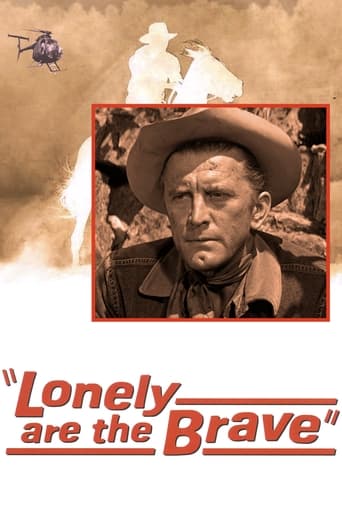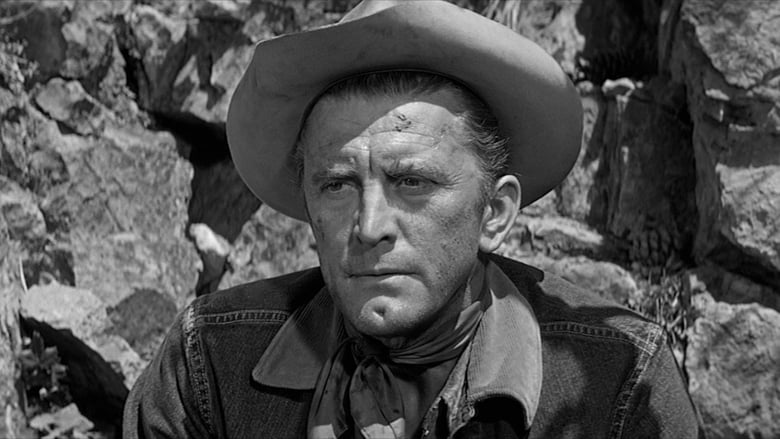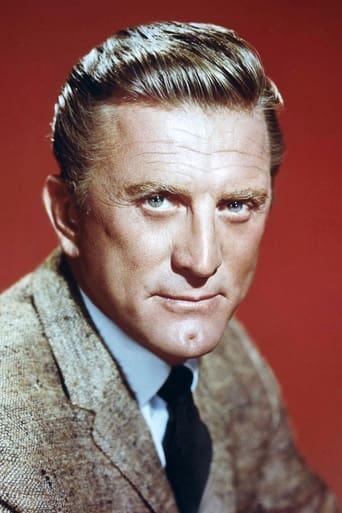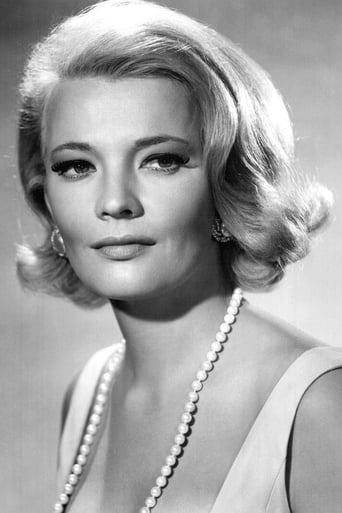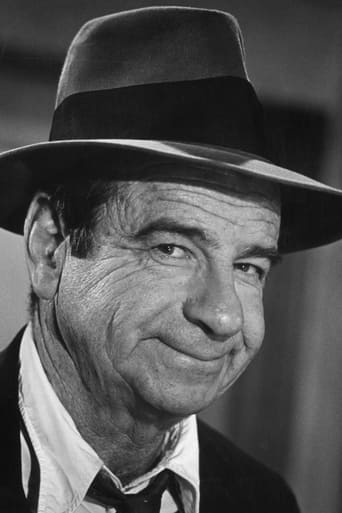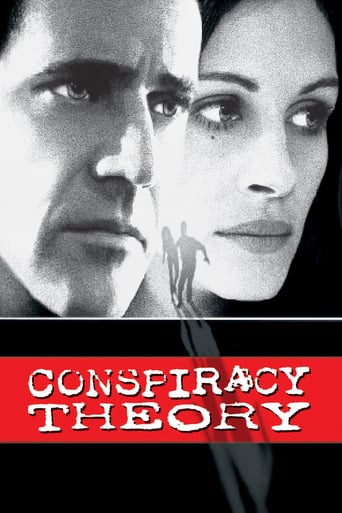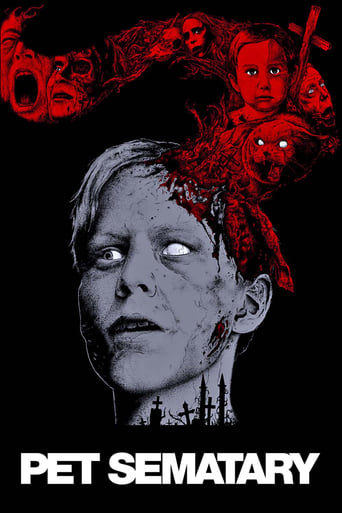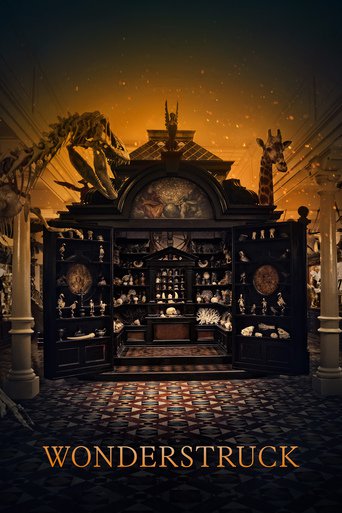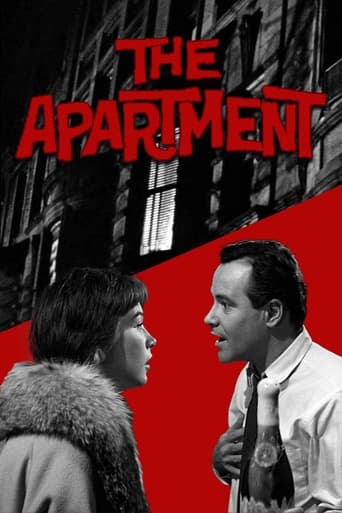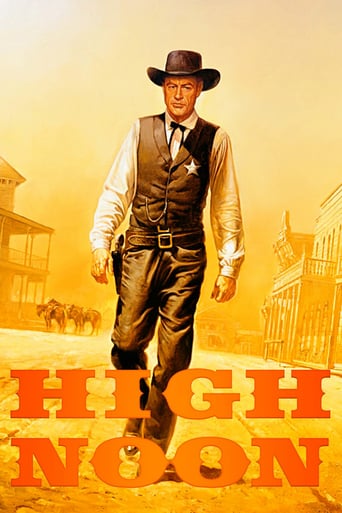Lonely Are the Brave (1962)
A fiercely independent cowboy arranges to have himself locked up in jail in order to then escape with an old friend who has been sentenced to the penitentiary.
Watch Trailer
Free Trial Channels
Cast


Similar titles
Reviews
Good concept, poorly executed.
Did you people see the same film I saw?
This story has more twists and turns than a second-rate soap opera.
The film's masterful storytelling did its job. The message was clear. No need to overdo.
There are many things weighing in favor of this film: David Miller's direction is assured, honest, competent, and perceptive; Douglas, Matthau and Rowlands all post wonderful performances; photography is superlative; action sequences are of the highest order; and the script, especially the dialogue, by Donald Trumbo, is very good.Unfortunately, it is built upon a questionable premise. Even the most idealistic of souls has to know that you do not commit crimes to be taken into jail to release your brother, but first you ask him if he is willing to go along with that project. Fortunately, Douglas' brother is much wiser than he and refuses to break out of jail. Freedom-loving, idealistic Douglas has some strange quirks, not to mention a questionable military service record that includes a Purple Heart, and good civilian deeds besides beating up officers of the law. For somebody who apparently loves freedom so dearly, it is really strange that he has no idea how prison limits your freedom, especially because he had been in detention during his military service.The film gathers momentum when Douglas is on the run and police after him, but you know that things are not going to go well. Best single aspect in the whole movie: Douglas' love for his mare, Whisky. Plaudits for the trainers who managed to get the animal to perform so convincingly in such a difficult environment, both on the mountains and in the streets.I liked Matthau's understated performance and the way his character understands Douglas' motivations, but the law, even in 1962, did not allow cop offenders to get off so easy. Well deserved 7/10, a more credible premise would easily raise it to 9/10.
Without revealing too much about the ending, this is one of the saddest movies that I have seen in quite some time, and I was forced to assure myself that it was only a movie and that everyone was able to walk off the set at the end, including Whiskey. Right!The cast is excellent, led by Kirk Douglas as John W. (Jack) Burns, a deeply individualistic cowboy caught in the wrong era, the early 1960's, as the march of modern civilization and technology continue to crowd him out of his natural world, a world without fences, signs, and established rules of behavior. Douglas is supported by Walter Matthau in one of his best performances as the very human Sheriff Morey Johnson in pursuit of Burns only by duty, Gina Rowlands as the former lover of Burns and the current wife of his best friend, George Kennedy as a cruel and villainous jailer, a young Carroll O'Connor as a trucker with a destination, and William Schallert as Matthau's annoying sidekick. If you've ever been forced to work all day long with someone you can't stand, just take a look at Matthau here as he reacts to Schallert's character. Right!This movie, which was shot in and around the Albuquerque, New Mexico area immediately takes me back to my own life during the same time in 1962 when I began pestering my parents to move to that very same place. As a very impressionable thirteen year old, I had seen a full page article in a magazine advertising Rio Rancho Estates, somewhere near the Rio Grande and not far from Albuquerque. Featured in that ad was a drawing of a free-spirited cowboy and his horse, who were the spittin' images of John W. Burns and Whiskey pausing before a pristine scene of vast expanses with no signs, fences, or impediments. As a stifled, smothered, and crowded Jersey kid with an unruly, independent streak, give me a home where the buffalo roam.The beginning of the film hints at its tragic end. As an idealistic teenager, I might have sympathized with Burns but not so much as an adult. At some point, we need to seek harmony in the world as it is, recognize what can't be changed, and find inner peace. Still, there is the staunch individualist within me who wanted Burns to succeed, just as Sheriff Johnson was internally rooting for him while conducting his official obligation of pursuing him. Whiskey's rebelliousness and her aversion to restrictive saddles is a reflection of the same, fierce spirit of independence within her human companion. The steep and tortuous ridge that man and horse are forced to overcome symbolizes the difficult challenge of life itself for all of us. To me, the details and minor flaws of the story seem insignificant in comparison to the overall message of the freedom for which we all strive but cannot achieve, at least not in this life.Did you recognize the nasty, one-armed man played by Bill Raisch, who also portrayed the one-armed man in "The Fugitive" television series? Too young for that? What a shame. When I searched for the meaning of the Spanish word "cobarde", I found "coward". Calling Burns a coward is the ultimate instance of irony because, as we all know by now, "Lonely Are the BRAVE".
Released in 1962 and directed by David Miller from a novel by Edward Abbey, "Lonely are the Brave" is a Western taking place in modern times (the early 60s, that is) starring Kirk Douglas as Jack Burns, an independent New Mexican cowhand who's a likable loner. He lands himself in jail in order to help his old friend, Paul (Michael Kane), who is doomed for the penitentiary for a couple of years; but Paul doesn't want to escape because it would add several years to his sentence if caught. So Burns breaks out on his own and is chased by Sheriff Johnson (Walter Matthau) and others (George Kennedy) with the aid of a military helicopter, etc. Will he get away? Gena Rowlands is on hand as Paul's wife.This modern Western cogently conveys how civilization with its corresponding government and never-ending laws naturally squelches personal independence and freedom. The bigger the populace means the bigger the governing regulations, and the less the liberty. One starts to suffocate in a world of borders, fences and laws. These are human-made inventions that don't even exist. Fly over the USA and you'll see no state or county borders or city limits. They're all human-made inventions that don't exist, except in a legal sense. Burns hearkens back to an earlier era where one didn't even need an ID. He doesn't fit into the mold of the modern world. All he has is his mare, Whiskey, the clothes on his back and his basic necessities. They're all a real cowboy needs, but the cowboy was a vanishing breed circa 1961.Director Miller wisely accentuates Gena's curvy beauty as Paul's wife, Jerri. The nature of her relationship with Burns is initially a mystery, but all is revealed before the final act and it's well done. Whether someone is married or not, it doesn't mean s/he can't love someone else who's single or married. But marriage itself is a border that cannot be lawfully crossed except by the person's spouse. The film acknowledges this and so do Burns and Jerri. They're people with feelings, but they're also wise and hence don't allow their passions to compel them to trespass marital fences.All these items amongst others (like the quality score) make "Lonely are the Brave" a minor near-masterpiece. Unfortunately, it's flawed by some tedious stretches, like the overlong jail sequence, and unconvincing or dumb elements; for instance, the idea that Burns wouldn't know enough to make sure there weren't any cars before crossing a highway on horseback (Seriously?). It's also marred by B&W photography, which would've really come alive if shot in color. The basic plot and theme were done later by the superior "First Blood" (1982) and "The Electric Horseman" (1979) respectively. The film runs 107 minutes and was shot in the Albuquerque, New Mexico, area.GRADE: B+
Jack Bondi is a confessed cowhand and loner, not into setting up house with anyone, but still able to love, although not in a typical fashion. What surrounds him must allow for his special brand of solitude and his slowly fading, cowboy ways.His horse, Whiskey, is fidgety, likes to play, and dislikes the encroaching roads and signs as much as Jack does. They command, as Jack lists them,"no hunting, no hiking, no admission, no trespassing, private property, closed area, start moving, go away, get lost, drop dead!" Please, don't read more of this if you don't want to know what takes place within the jail.Jack wants to free his friend, Paul Burns, from the local jail. Paul has two years to endure before his release for assisting illegal aliens. A previous bar brawl, which netted him an arrest, didn't open that door, so he hits a cop to earn a one year stretch, knowing he won't be there long. But Paul doesn't want to escape, which leaves Jack to break out alone to flee into the mountains with Whiskey. It is their attempts to reach the peak and down into the woods on the other side, which would eventually lead to Mexico, that takes up most of the movie.Overall, it's a good film, despite the disappointment some may feel toward the end. If the reader loves horses, then this one's for you, as it shows just how inseparable an owner and his/her mount can become.

